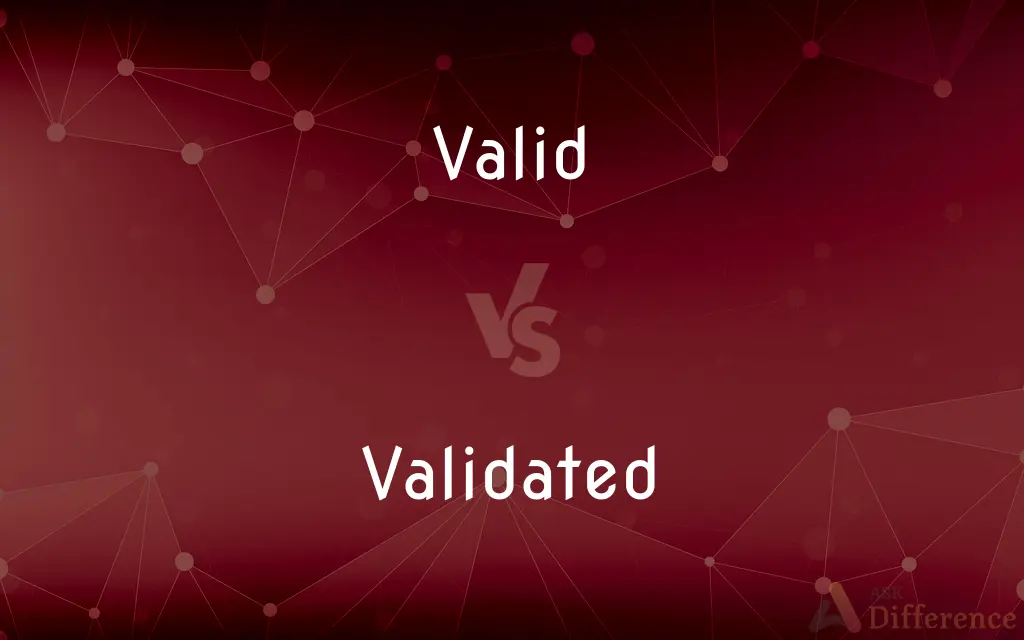Valid vs. Validated — What's the Difference?
By Tayyaba Rehman — Updated on October 27, 2023
"Valid" refers to something being logically sound or legally acceptable. "Validated" means that something has been checked or proven to be valid.

Difference Between Valid and Validated
Table of Contents
ADVERTISEMENT
Key Differences
"Valid" is an adjective that characterizes something as well-founded, justifiable, or legally binding. It describes inherent properties or qualities that make something acceptable or reasonable. On the other hand, "validated" is the past tense of the verb "validate," which means to check, verify, or confirm the validity of something.
When one states that an argument is "valid," they are suggesting that the argument is logically sound and its conclusions follow its premises. Conversely, when an argument has been "validated," it means that it has undergone a process of examination to ensure its validity or soundness. This distinction showcases the inherent quality versus the process undergone.
In legal contexts, a contract may be described as "valid" if it meets all the legal requirements and is enforceable. However, if a contract has been "validated," it might mean that it has been reviewed, perhaps by legal professionals, and confirmed to be in line with all legal stipulations.
In everyday scenarios, a ticket might be "valid" for entry into an event, meaning it's acceptable for use. If that ticket is "validated" at the entrance, it has been checked and confirmed for its authenticity or appropriateness for use.
In the world of research, data or results might be inherently "valid," meaning they are accurate and reliable. If these results are "validated," it implies that they've undergone a process where their accuracy and reliability have been confirmed, possibly through replication or peer review.
ADVERTISEMENT
Comparison Chart
Part of Speech
Adjective
Verb (past tense)
Indicates
Inherent quality or soundness
Process of confirming validity
Usage
Describes something as acceptable or reasonable
Describes something that has been checked or verified
Contexts
Logical, legal, general
Research, review, verification
Dependence
Independent description
Requires an external action or confirmation
Compare with Definitions
Valid
Based on truth or fact; reliable.
The information provided was valid and helpful.
Validated
Verified for use or implementation.
The software was validated for commercial use.
Valid
Legally acceptable or binding.
The contract was valid for another two years.
Validated
Confirmed or endorsed, especially by an authority.
Her skills were validated by the certification she received.
Valid
Appropriate or applicable in a given situation.
Your ticket is valid for any show today.
Validated
Checked or proven as accurate.
The results were validated after thorough examination.
Valid
Effective or binding without qualification or exception.
The offer is valid only for new customers.
Validated
Recognized or affirmed as emotionally valid or sound.
His feelings were validated during the therapy session.
Valid
Well grounded; just
A valid objection.
Validated
To establish the soundness, accuracy, or legitimacy of
Validate the test results.
Validate a concern.
Valid
Producing the desired results; efficacious
Valid methods.
Validated
To declare or make legally valid
Validate an election.
Valid
Having legal force; effective or binding
A valid title.
Validated
To mark with an indication of official sanction
The official validated my passport with a stamp.
Valid
Containing premises from which the conclusion may logically be derived
A valid argument.
Validated
Simple past tense and past participle of validate
Valid
Correctly inferred or deduced from a premise
A valid conclusion.
Validated
Declared or made valid.
Valid
(Archaic) Of sound health; robust.
Validated
Having experienced emotional validation.
Valid
Well grounded or justifiable, pertinent.
I will believe him as soon as he offers a valid answer.
Validated
Declared or made legally valid;
A validated claim
Valid
Acceptable, proper or correct; in accordance with the rules.
A valid format for the date is DD/MM/YY.
Do not drive without a valid license.
Validated
Demonstrated or proven the validity of.
The scientist validated her hypothesis through experiments.
Valid
Related to the current topic, or presented within context, relevant.
Valid
(logic) Of a formula or system: such that it evaluates to true regardless of the input values.
Valid
(logic) Of an argument: whose conclusion is always true whenever its premises are true.
An argument is valid if and only if the set consisting of both (1) all of its premises and (2) the contradictory of its conclusion is inconsistent.
Valid
Genuine - as distinguished from efficient or regular - sacrament.
Valid
Strong; powerful; efficient.
Valid
Having sufficient strength or force; founded in truth; capable of being justified, defended, or supported; not weak or defective; sound; good; efficacious; as, a valid argument; a valid objection.
An answer that is open to no valid exception.
Valid
Having legal strength or force; executed with the proper formalities; incapable of being rightfully overthrown or set aside; as, a valid deed; a valid covenant; a valid instrument of any kind; a valid claim or title; a valid marriage.
Valid
Well grounded in logic or truth or having legal force;
A valid inference
A valid argument
A valid contract
A valid license
Valid
Still legally acceptable;
The license is still valid
Valid
Sound in logic or reasoning.
His argument was valid and convinced the audience.
Common Curiosities
How is research data validated?
Through methods like replication, peer review, or cross-checking.
Are "valid" and "validated" interchangeable?
No, "valid" describes inherent quality, while "validated" refers to a confirmation process.
Is a validated ticket always valid?
Typically, yes, as it has been checked for authenticity or appropriateness.
Can something be valid in one context but not in another?
Yes, for instance, a ticket might be valid for one event but not another.
Can an argument be valid but not validated?
Yes, it might be logically sound but not yet checked or verified.
Is every valid contract also validated?
Not always. A contract might meet legal criteria without undergoing a review.
What tools are used to validate research?
Tools like statistical analyses, peer reviews, and experimental replication.
Can feelings be validated?
Yes, acknowledging and recognizing someone's emotions is a form of validation.
What's the opposite of valid?
Invalid.
Is a valid argument always true?
Not necessarily; it's logically sound, but its premises might be false.
How is software validated?
Through testing, review, and meeting specified requirements.
Can an idea be both valid and validated?
Yes, it can inherently be sound (valid) and also be checked and confirmed (validated).
Are all validated items or ideas valid?
Ideally, yes, but errors in the validation process can occur.
If something is invalidated, was it once validated?
Not necessarily; "invalidate" means to nullify or debunk, regardless of prior validation.
Can opinions be valid?
Yes, opinions can be considered valid if they are well-founded or reasonable.
Share Your Discovery

Previous Comparison
Electro vs. Techno
Next Comparison
Duchy vs. DukedomAuthor Spotlight
Written by
Tayyaba RehmanTayyaba Rehman is a distinguished writer, currently serving as a primary contributor to askdifference.com. As a researcher in semantics and etymology, Tayyaba's passion for the complexity of languages and their distinctions has found a perfect home on the platform. Tayyaba delves into the intricacies of language, distinguishing between commonly confused words and phrases, thereby providing clarity for readers worldwide.
















































